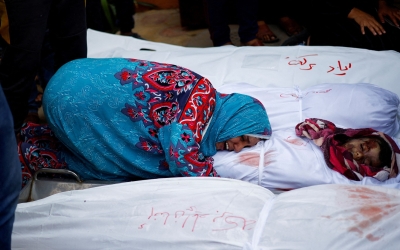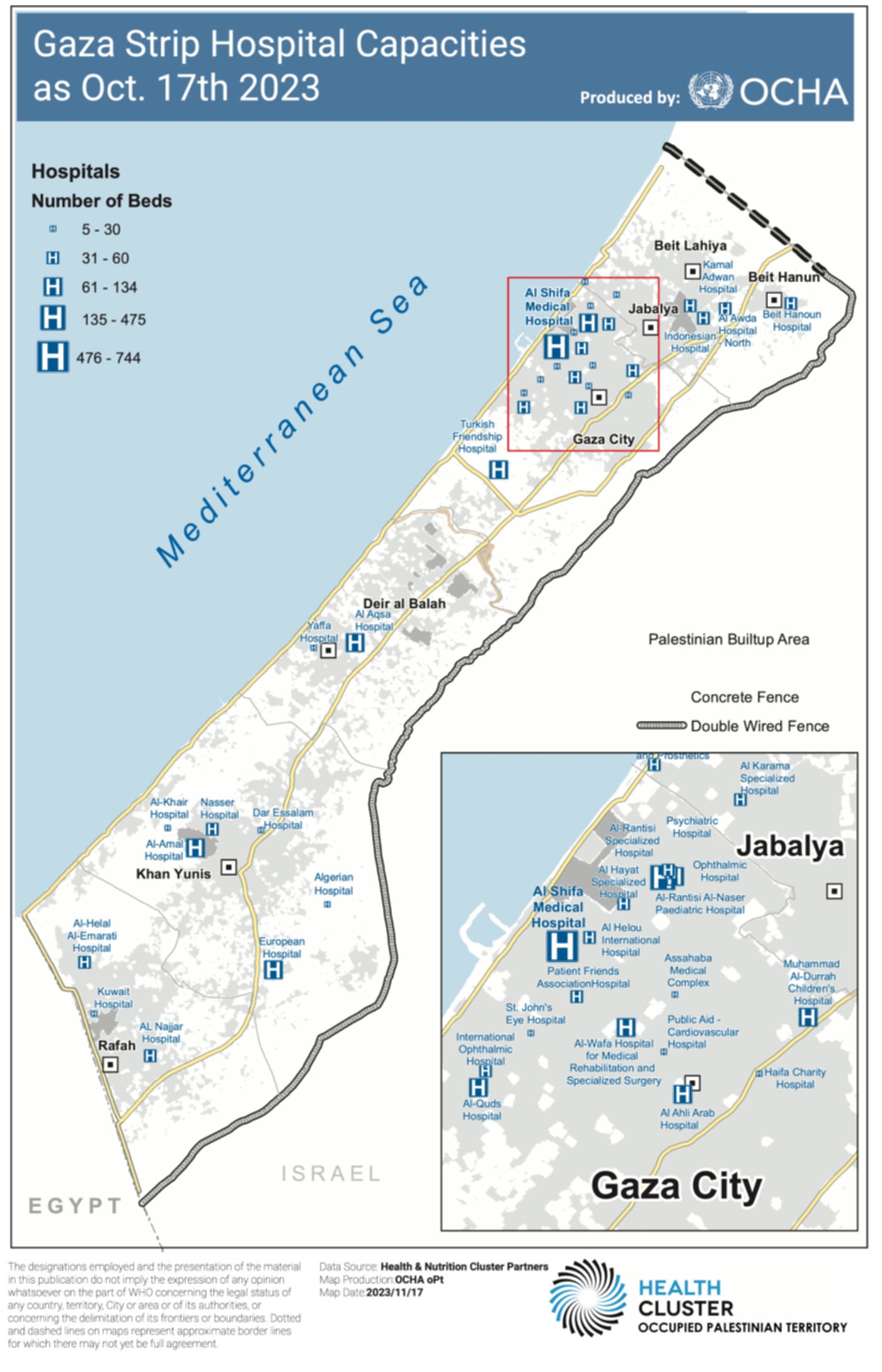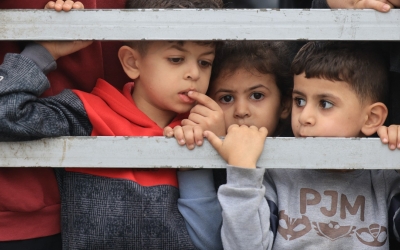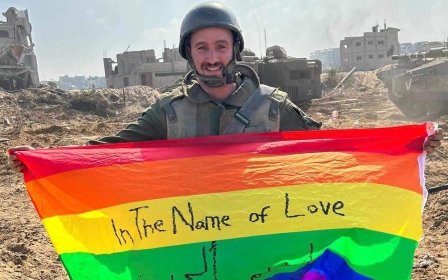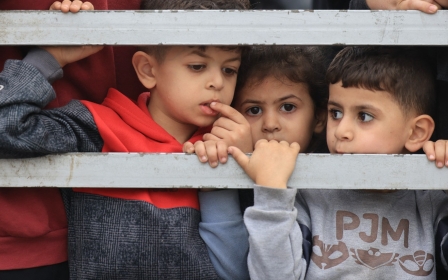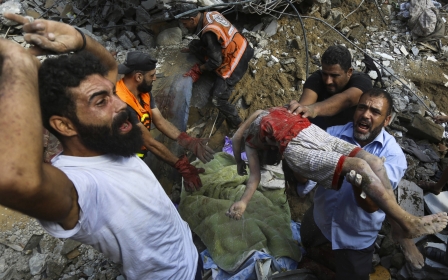Israel-Palestine war: How and why did Gaza hospitals become primary targets?
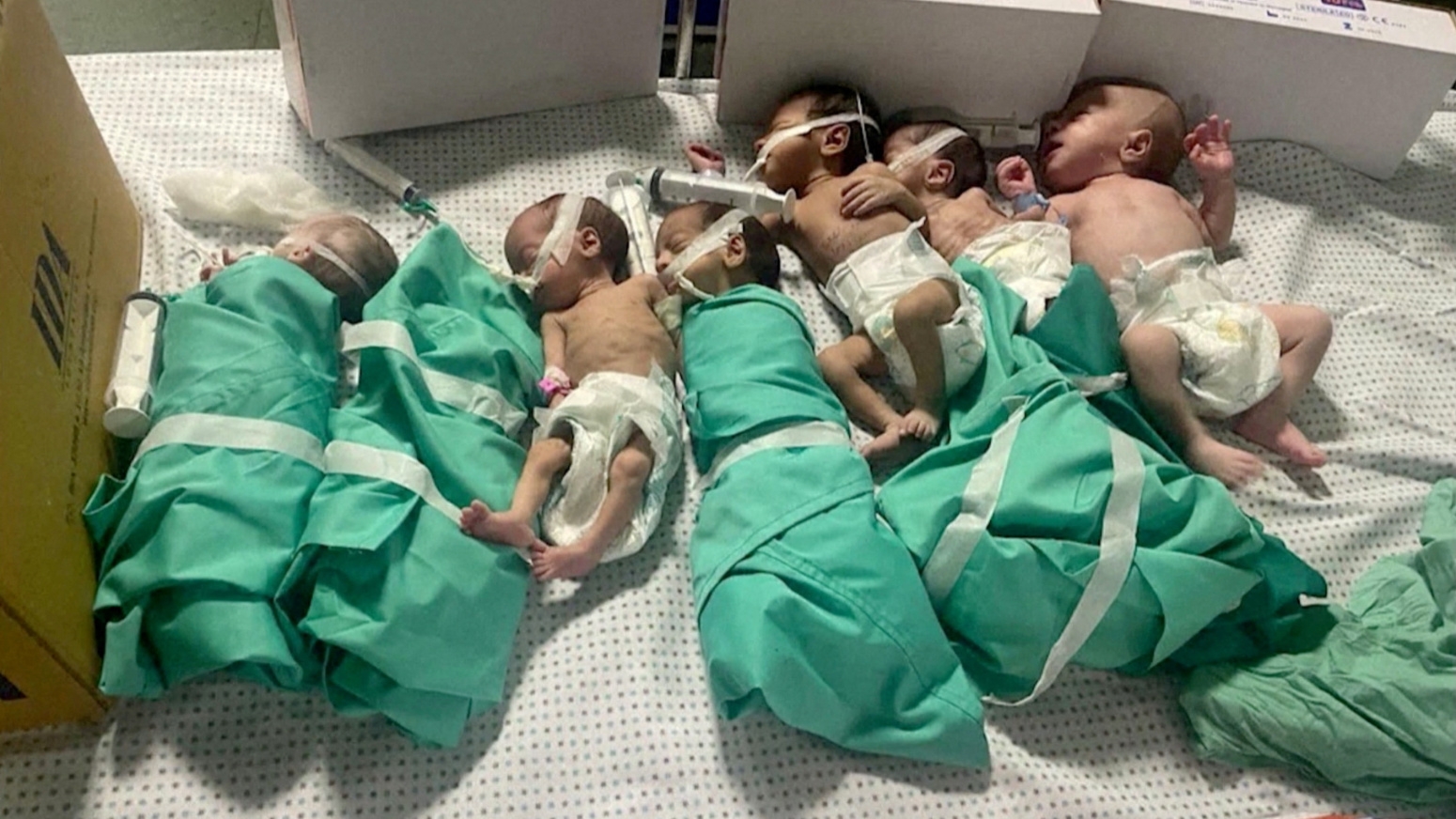
Hospitals and medical facilities have been caught in the crossfire during Israel's war in Gaza - both literally and in the clashing narratives over the conflict.
Palestinian officials have said a staggering 22 hospitals and 49 medical centres have completely stopped working because of air strikes and Israel's decision to suspend all fuel and electricity supplies to the strip since 9 October.
With Gaza's biggest hospital, al-Shifa, surrounded by Israeli tanks, leaving the fate of thousands of people trapped inside unknown, questions have arisen about the unprecedented focus on hospitals in the current war.
Israel's initial arguments
Ever since Hamas won the Palestinian legislative elections in January 2006, Israel has repeatedly claimed that civilian facilities in Gaza, such as universities, schools and, most notably, hospitals, were hiding grounds for Hamas and their weapons.
While the Israeli government hasn't provided concrete evidence to back up such claims, it has repeatedly used them to justify its bombing of civilian facilities.
"It's a controversy of facts, and in this instance, Israel has not a shred of evidence that this is true," human rights lawyer Noura Erakat told Middle East Eye.
Erakat spoke of the "Dahiya doctrine", which took shape after Israel's 2006 war with Hezbollah in Lebanon.
The military strategy involves using disproportionate force on civilian infrastructure in territories hostile to Israel to punish its enemies, which is what the country did to Beirut’s Dahiya suburb back then.
According to Erakat, the doctrine "basically transformed civilian targets into military ones, we see the emergence of the framework of human shielding, from 2006 to the present", invoking Israel's accusations of Hamas using civilians as human shields in its bombing campaigns on the strip.
Follow Middle East Eye's live coverage of the Israel-Palestine war
While the doctrine itself was not mentioned by any Israeli official, calls for collective punishment are not uncommon.
Noticeably, on 13 October, Israeli President Isaac Herzog claimed that "an entire nation" was responsible for Hamas's actions, saying Palestinians could have revolted against the group.
'Hospitals cannot be free-fire zones'
- Omar Shakir, Human Rights Watch
"Of course, there are many, many innocent Palestinians who don't agree to this," he added. "But unfortunately, in their homes, there are missiles shooting at us, at my children."
Herzog's comments followed a statement by Israel's Defence Minister Yoav Gallant who, on 9 October, claimed it forces were dealing with "human animals" when Israel announced that it was tightening its siege on the Gaza Strip.
More recently, Israel's Minister of Agriculture Avi Dichter said the country's operations in Gaza would "result in some sort of Nakba", referring to the mass displacement of Palestinians following the creation of Israel in 1948.
Israeli Prime Minister Benjamin Netanyahu has since instructed his ministers to choose their words more carefully when discussing the war.
Amid these statements, Israeli officials kept repeating their claims about Hamas tunnels being present under hospitals, going as far as saying Hamas had headquarters under al-Shifa hospital.
Al-Shifa is Palestine's largest hospital, offering a wide range of services difficult to find in the rest of Gaza.
Since 7 October, the Ministry of Health has used the building to hold press conferences where it would provide updates on the Palestinian death toll. The ministry has been unable to update its numbers since the Israeli siege of the hospital started last week.
Israel hopes to achieve a strategic objective by taking over the hospital, while the medical complex itself, along with the displaced and wounded in it, became a wider symbol of suffering in this war.
"Hospitals have special protections under international humanitarian law," said Omar Shakir, Israel and Palestine director for Human Rights Watch.
"It does not suffice to say that armed groups are using hospitals for military purposes."
Prior to this latest escalation, Syrian and Russian forces used similar arguments to justify their targeting of hospitals and other medical facilities in Syria.
Article 19 of the Geneva Conventions establishes that units of medical service "may in no circumstances be attacked, but shall at all times be respected and protected by the Parties to the conflict".
Additionally, Israel is recognised as an occupying power in the West Bank and Gaza. Article 56 of the conventions says that "to the fullest extent of the means available to it, the Occupying Power has the duty of ensuring and maintaining, with the cooperation of national and local authorities, the medical and hospital establishments and services, public health and hygiene in the occupied territory".
Shakir said that hospitals lose their safety status once they are used to commit acts unlawful to the enemy. Human Rights Watch has, so far, found no evidence of circumstances that fall under these conditions.
"Even if those particular standards had been met, hospitals cannot be free-fire zones," he added, saying that civilians who do not evacuate retain their protections under international humanitarian law.
'Beyond our worst nightmares'
The bombing of al-Ahli Arab hospital on 17 October caused widespread uproar across the Middle East and the broader Arab world.
Israel at the time was quick to deflect blame, claiming the attack was caused by a failed Palestinian Islamic Jihad rocket launch.
Since that event, however, Israel has repeatedly bombed medical infrastructures in Gaza, killing 198 medical workers, as per the Palestinian health ministry's latest update on Friday.
"What we are seeing today is beyond our worst nightmares," Rohan Talbot, director of advocacy and campaigns at health NGO Medical Aid for Palestinians, told MEE.
"It's the total effective dismantlement of the healthcare system in Gaza City and in the north."
Prior to Israel's ground incursion, it said the bulk of its operations would be focused on the north of Gaza, where Gaza City, along with most of the strip's main hospitals, are located.
Citizens were instructed to flee their homes and go south.
While Israel kept bombing the south, it completely closed off the north, cutting off aid, resources, and fuel. Doctors often resorted to extreme measures such as performing operations without anesthetics.
Without enough fuel to power generators, some hospitals were forced to conduct surgery using phone flashlights. Repeating Israeli airstrikes and sniper shots on hospital wards, medical staff and patients added to the mounting pressure.
The lack of electricity also caused the reported death of infants in incubators.
"It is the total obstruction of central healthcare across the board," Talbot added. "And sometimes the total destruction of healthcare when services have been attacked directly."
Talbot said there was only one functional hospital remaining in Gaza, the al-Ahli Arab Hospital.
Shakir added that attacks on hospitals had been "in conjunction" with the targeting of other civilian infrastructure in the besieged enclave.
"We know that refugee camps, schools, UN facilities, residential buildings, mosques, have all been struck as well," he said.
"I think understanding the attacks on hospitals in the context of much larger, pretty methodical attacks on civilian infrastructures is important to note. It's not happening in isolation from that."
Additionally, Talbot said that Israel's actions have "the effect of preventing civilian life being possible in the north of Gaza".
Meanwhile, Erakat said she believed that the reason behind the operations in the northern part was to "ethnically cleanse" the area.
"It is part of a settler colonial territorial expansion in the name of security," she said.
Middle East Eye propose une couverture et une analyse indépendantes et incomparables du Moyen-Orient, de l’Afrique du Nord et d’autres régions du monde. Pour en savoir plus sur la reprise de ce contenu et les frais qui s’appliquent, veuillez remplir ce formulaire [en anglais]. Pour en savoir plus sur MEE, cliquez ici [en anglais].


